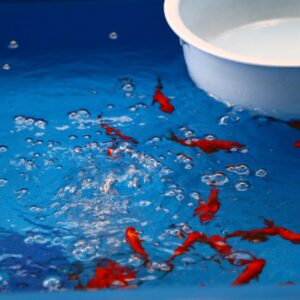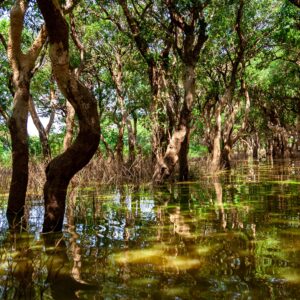Reimagining Africa’s Blue Wealth for People, Planet, and Prosperity...
Nigeria Is the Blue Vanguard of West Africa’s Future, with over 850 kilometers of Atlantic coastline, thousands of inland rivers, estuaries, lakes, and rich marine biodiversity, Nigeria is uniquely positioned to lead a just and regenerative blue transition in Africa. Yet much of this potential remains untapped or worse, degraded. Pollution, unsustainable extraction, and policy neglect have left aquatic ecosystems vulnerable, coastal communities underserved, and youth disconnected from opportunity. Free2Blue Nigeria exists to change that narrative from degradation to restoration, from marginalization to mobilization, and from resource loss to value creation.
Activating Nigeria’s Blue Prosperity
Over 70% of the Earth is water, and Nigeria controls an expansive stretch of marine territory and inland water bodies across its 12 River Basins and the Gulf of Guinea. This vast aquatic network is a national treasure chest of livelihoods, biodiversity, and climate regulation potential. But currently, less than 10% of Nigeria’s blue economy is
sustainably harnessed. Meanwhile, marine plastic pollution, sand dredging, oil spills, and illegal fishing continue to cost the nation billions in lost jobs and degraded ecosystems. Free2Blue Nigeria aims to unlock this latent potential protecting and regenerating blue capital to build a resilient, inclusive, and climate-smart national economy.

Reclaiming Nigeria’s Blue Billions
Nigeria loses billions annually to illegal, unreported, and unregulated (IUU) fishing, marine pollution, and unsustainable coastal development. These losses aren’t just financial; they represent stolen livelihoods, broken communities, and compromised futures. Free2Blue Nigeria champions a new wave of blue justice,
where:
Coastal and riverine communities govern their aquatic resources,
Youth and women are empowered as builders of the blue economy, and
Aquatic ecosystems from the Niger Delta to Lake Chad are restored for future generations.

Blue Economies for Green Growth
For Nigeria, the blue economy is more than a sector it’s a
pathway to equity, food security, and climate resilience. From sustainable aquaculture and marine biotech to clean ocean energy and blue tourism, Free2Blue Nigeria ignites innovation and inclusion across every water-based opportunity.
It enables:
Jobs for youth and women in emerging blue industries
Food Security – Powered by community-led fisheries and aquatic agriculture
Climate Resilience – Through mangrove restoration, wetland protection, and flood-smart infrastructure
Digital & Cultural Innovation – Driven by blue tech, heritage tourism, and local enterprises

Free2Blue Sustainability Impact Program Areas
Activating Blue Potential for a Just, Regenerative and Climate- Smart Nigeria
Free2Blue Nigeria champions a transformative suite of aquatic and marine-based sustainability impact programs that respond to Nigeria’s most pressing development challenges while unlocking new pathways for youth employment, ecological regeneration, economic economic innovation, and community empowerment. These programs are not siloed they are interconnected, reinforcing each other to build resilient blue economies that prioritize equity, ecosystem health, and long-term value creation.
Integrated Impact Across All Areas Across all programs, Free2Blue ensures:
Free2Blue Nigeria champions a transformative suite of aquatic and marine-based sustainability impact programs that respond to Nigeria’s most pressing development challenges while unlocking new pathways for youth employment, ecological regeneration, economic economic innovation, and community empowerment. These programs are not siloed they are interconnected, reinforcing each other to build resilient blue economies that prioritize equity, ecosystem health, and long-term value creation.
- Gender equity and inclusion Intergenerational leadership and mentorship.
- Data-driven decision-making.
- Community-centered accountability.
- Alignment with the African Union’s Blue Economy Strategy and SDGs.
The Core Sustainability Impact Program areas
of Free2Blue Nigeria are outlined below
Platforms & Portals
Browse All Eco2ruppers platforms, portals and microsites.


















